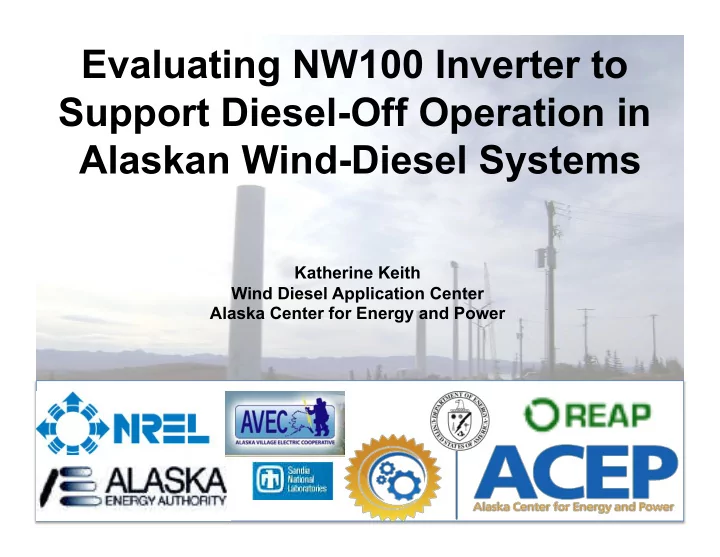

Evaluating NW100 Inverter to Support Diesel-Off Operation in Alaskan Wind-Diesel Systems Katherine Keith Wind Diesel Application Center Alaska Center for Energy and Power
ACEP RESEARCH MISSION: To meet state and local need for applied energy research by working towards developing, refining, demonstrating, and ultimately helping commercialize marketable technologies that provide practical solutions to real- world problems.
Role of ACEP ► Verify performance and reliability of equipment ► Assess technical and economic feasibility ► Test emissions ► Integration with existing power systems ► Resource assessment ► Procurement experiments ► Work with manufacturers to improve products for use in Alaska
Role of ACEP Serve as an impartial agent on behalf of Alaskan communities and agencies to ensure we are investing wisely in energy projects that make sense and that contribute to the long-term benefit of our residents Help leverage external resources to address Alaska’s energy challenges (funding, businesses, national laboratories, other universities, etc)
The purpose of the Alaska Wind-Diesel Applications Center (WiDAC) is to support the broader deployment of cost-effective wind-diesel technologies to reduce and/or stabilize the cost of energy in Alaska’s rural communities.
Alaska Wind-Diesel Test Center Addressing issues to improve penetration of wind-diesel systems through improvements in control, energy storage, low-load diesel, high penetration wind.
1. Technical Base-lining 2. Development and Deployment of High Penetration Wind Systems 1. Revitalization of Wales 2. Grid Stability 3. Energy Storage 3. Optimization of Component Integration
Project Statement ACEP proposes to analyze state of the art inverters and specifically test the ability of the Northwind 100 inverter to control the system in a diesel-off mode.
Project Objectives 1. Address technical issues related to higher penetration of wind. 2. Enhance the rate of success in a diesel-off mode. 3. Confirm that the NW 100 inverter can stabilize power quality in a diesel-off mode. 4. Solidify Alaska as a leader in wind- diesel technology world-wide .
Work Plan Phase One: Review of inverter technology and design of a testing protocol for the NW100B inverter. Phase Two: Inverter testing at ACEP’s Wind-Diesel Test Bed. Phase Three: Field testing in an AVEC community will be based upon the results of phase two.
Northern Power: NW100 • 28 turbines in 10 communities – Kasigluk – Toksook (4) – Chevak – Hopper Bay – Mekoryuk – Gambell – Savoonga (1) – Unalakleet (6) – Delta Junction – Kotzebue (1)
Advantages of Northern Power Inverters • Manufactured in house and in the US. • Advanced control algorithms have been designed which allow for variable VAR output. • The inverters can provide voltage regulation. • Inverters have moved beyond the traditional master-slave arrangement. • NW100 turbines in 10 communities.
The Challenges of Diesel-Off • VAR support (reactive power) is needed for induction motors. • The diesels are what provides the voltage and frequency regulation as well as VARs. • Real and reactive power must be balanced at all times. • Without energy storage a spinning reserve is needed to allow for wind fluctuations. • Capital cost of ancillary equipment is high.
The Benefits of Diesel-Off • Excess wind energy can be transferred to secondary loads. • Economic benefits from reduction in diesel increases exponentially when the diesels can be shut off. • Offset over 50% of diesel for electrical generation. • Diesel can be offset for thermal loads
Multiple Solutions • VARs can be provided by a synchronous condenser or an inverter. • Frequency is balanced with a secondary load controller. • Voltage must be regulated with power electronics. • The need for spinning reserve can be reduced with energy storage.
Why Inverters vs. Others: • Batteries can provide time shifting and power quality stabilization. (V/F/LS/$$$) • Flywheels provide power quality stabilization (V/F/SS/$$$). • Inverters can provide power quality stabilization and VAR support ((V/F/VAR/ $) in a matter that is economical to dispatch in numerous communities across the state.
For more information visit: www.uaf.edu/acep
Recommend
More recommend